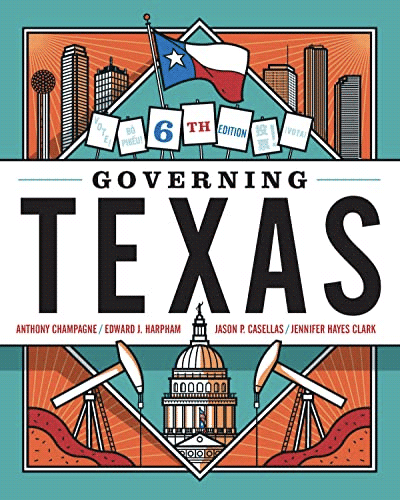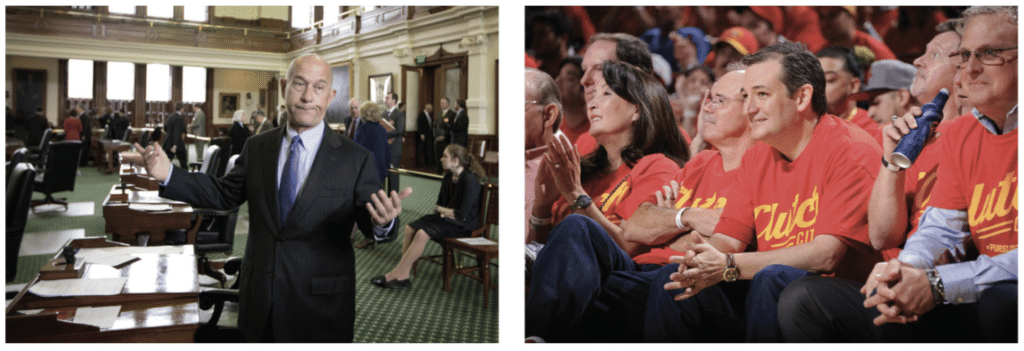MGA Founder, Andrea McWilliams, Featured in Texas College Government Textbook, Governing Texas.
View Our Original Article
MGA is proud to announce our Founder, Andrea McWilliams, has been prominently featured as one of Texas’ most “successful lobbyists” in a collegiate level Texas Government textbook that is part of the curriculum at institutions like The University of Texas at Austin. Relevant textbook passages have been highlighted below in the book by Anthony Champagne (Author, University of Texas at Dallas), Edward J Harpham (Author, University of Texas at Dallas), Jason P Casellas (Author, University of Houston), and Jennifer Hayes Clark (Author, University of Houston).
Chapter 6, Interest Groups and Lobbying, highlights McWilliams’ access within the Texas Capitol.

Getting Access To Policy Makers
In order to communicate the goals of their interest groups to policy makers, lobbyists must first gain access to those policy makers. Such access, of course, imposes on the time of legislators, so lobbyists often spend significant sums entertaining them. That entertainment is one of the most criticized aspects of lobbying. From the lobbyists’ perspective, entertainment is an important tool for reaching policy makers and putting them in a congenial frame of mind. Entertainment by lobbyists can involve expensive dinners, golf, and other items and activities. For example, lobbyists for Texas Utilities (TXU) bought a $300 saddle for one state representative and a $200 bench for another, and treated a state senator to a trip to the Masters golf tournament, where they picked up the dinner tab as well. One House member received a gun as a gift, another received a jacket, and several got “deer processing” costs paid for by TXU. When former representative Lon Burnam (D-Fort Worth) proposed legislation to regulate consumer versions of stun guns, the lobbyist for TASER International as a joke gave Burnam a gift of a pink stun gun valued at more than $150. In 2018, Senator Ted Cruz attended three Houston Rockets basketball games using tickets valued at $12,000 gifted to him by Robert Marling, the CEO of Woodforest National Bank. While these tickets did not violate Senate rules, they nevertheless drew media scrutiny

State senator John Whitmire (D-Houston) was known for spending campaign contributions from interest groups on expenses not strictly campaign related. Republican U.S. senator Ted Cruz was criticized for accepting tickets to three Houston Rockets games in 2018 from a bank CEO, though the gift wasn’t prohibited by Senate rules.
More than $667 million was spent by lobbyists in Texas during the 2020 election cycle, according to Transparency USA, an organization that tracks lobbying spending nationwide. Texas lawmakers receive only $600 per month plus $190 a day when on legislative business, but they are permitted to use campaign contributions for expenses associated with holding office. This policy allows interest groups to fund lavish benefits for them. For example, Senator John Whitmire (D-Houston) used his contributions to fund a car lease for a BMW totaling over $100,000 over 10 years. In addition, he has spent nearly $300,000 in sports tickets for his hometown Houston Astros, Rockets, and Texans and classified the expenditures as “constituent entertainment.”
The Texas Ethics Commission keeps a list of registered lobbyists as well as of their clients. In 2022 there were 3,884 registered lobbyists in Texas. However, because of the loose nature of Texas reporting laws, it is unclear what these lobbyists were paid. The Texas Ethics Commission also collects information on how much lobbying firms spend to influence Texas lawmakers. In 2021 this sum reached an astonishing $3.6 million, and this is just the amount that was reported.
Sometimes lobbyists have long-standing personal ties to policy makers, and those bonds can be invaluable to the lobbyists’ clients. When lobbyist Andrea McWilliams celebrated her 40th birthday in California’s wine country, six Texas lawmakers traveled to California for the party, including the chair of the House Appropriations Committee and the chair of the Senate Public Education Committee. In McWilliams’s case, her personal ties to these lawmakers were probably strengthened by the fact that she and her clients had contributed more than $206,000 to their campaigns over the previous several years. In the 2021 legislative session, McWilliams was one of the highest-paid lobbyists, with a large number of clients and the second largest revenue-just over $8 million. Texas MonthLy listed her among the most powerful Texans, and a friend described her as a “consigliere to the powerful and political.”

Andrea McWilliams is one of Texas’s most highly paid and successful lobbyists.
Access to policy makers may also be gained by building support for an issue among their constituents. For example, interest groups might contact constituents to encourage them to write or call legislators about a bill and offer their opinions. Essentially, the interest group tries to mobilize interested voters to become involved in the political process on behalf of the group’s goals.
WHAT LOBBYISTS DO WITH ACCESS The public perception of lobbying may be that interested groups bring bags of money to members of the legislature in exchange for their votes on important bills. While lobbyists have no doubt showered legislators with gifts, sports tickets, and fancy meals, the reality is much more complex and far less underhanded. Once lobbyists obtain access to policy makers, they provide information that may be useful. For example, they may explain how a bill benefits a legislator’s district, or how it benefits the state, or how it is perceived as being unfair. Because the staffs of Texas legislators are small, lobbyists perform useful functions by explaining what numerous bills are intended to do. They may even write bills to be introduced by friendly legislators or write amendments to bills. Almost certainly, if a bill affects the interests of a lobbyist’s client and reaches a point in the legislative process where hearings are held on it, the lobbyist will arrange for testimony to be given at the hearing explaining the interest group’s viewpoint on the proposed legislation.
